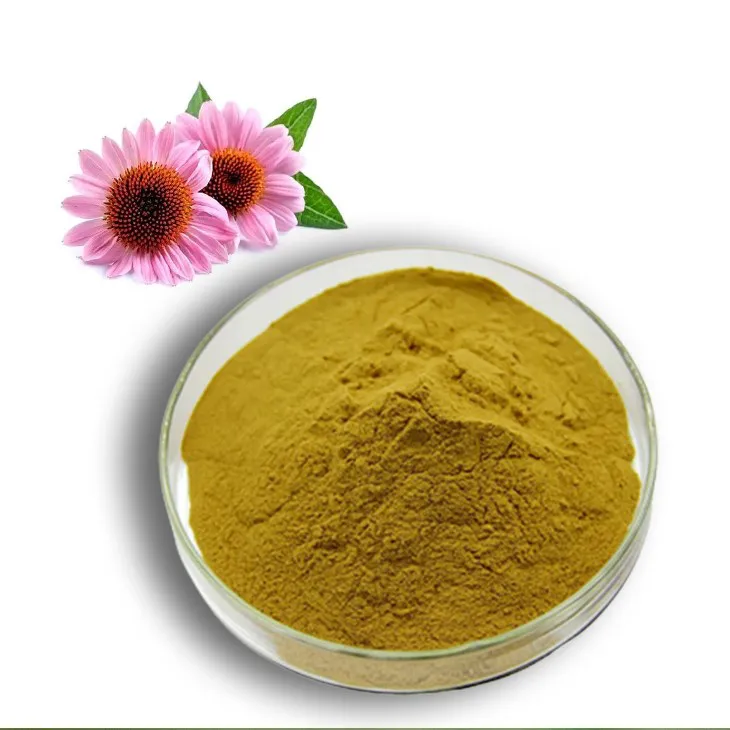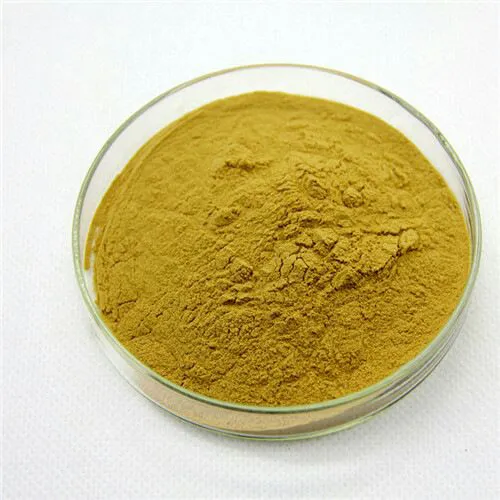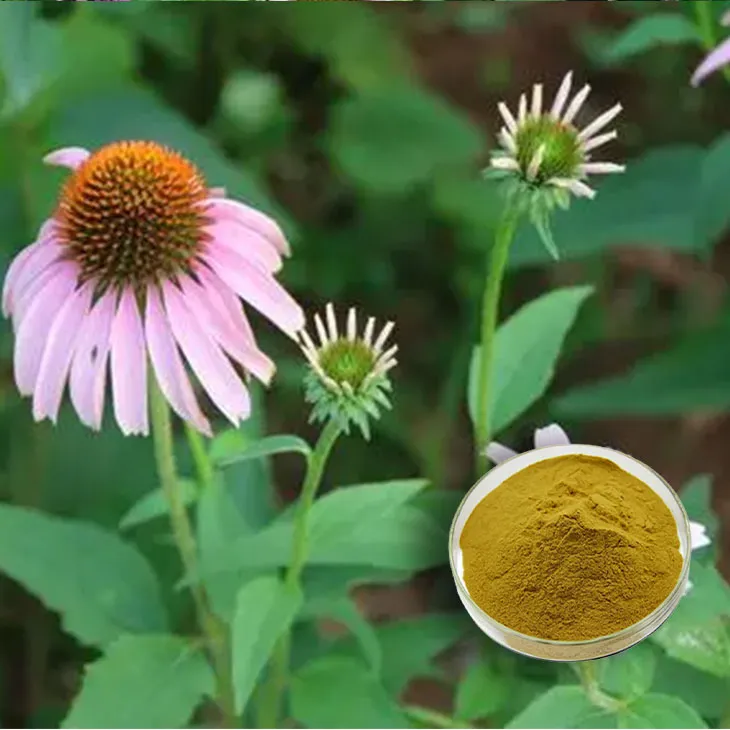- 0086-571-85302990
- sales@greenskybio.com
Application of Echinacea Extract in Skin Care.
2024-11-12

1. Introduction
Skin care has become an essential part of modern life as people are increasingly aware of the importance of maintaining a healthy and beautiful complexion. In the search for effective skin care ingredients, Echinacea Extract has emerged as a promising candidate. Echinacea, a genus of flowering plants in the daisy family, has a long history of medicinal use, particularly in North American indigenous medicine. In recent years, its application in skin care has been widely explored due to its various beneficial properties for the skin.

2. Anti - inflammatory Properties
2.1 Inflammation and Skin Health
Inflammation is a natural response of the body to various stimuli such as injury, infection, or exposure to irritants. However, chronic inflammation can have a negative impact on skin health. It can lead to skin problems like acne, eczema, and psoriasis. Echinacea Extract contains several bioactive compounds that possess anti - inflammatory properties.
2.2 Active Compounds for Anti - inflammation
One of the main components in Echinacea Extract is cichoric acid. This compound has been shown to inhibit the production of pro - inflammatory cytokines. Cytokines are small proteins that play a crucial role in the immune response and inflammation. By reducing the levels of these pro - inflammatory cytokines, cichoric acid helps to calm the skin and reduce redness and swelling. Another important compound is echinacoside, which also exhibits anti - inflammatory activity. It works by modulating the activity of immune cells in the skin, preventing them from over - reacting and causing excessive inflammation.
2.3 Application in Inflammatory Skin Conditions
In the treatment of acne, for example, the anti - inflammatory properties of Echinacea extract can help reduce the inflammation associated with clogged pores and bacterial infections. It can soothe the red, inflamed pimples and prevent further breakouts. For eczema and psoriasis, which are chronic inflammatory skin diseases, Echinacea extract can be used in topical formulations to relieve itching, reduce inflammation, and promote the healing of damaged skin.
3. Antioxidant Properties
3.1 Oxidative Stress and Skin Aging
Oxidative stress occurs when there is an imbalance between the production of reactive oxygen species (ROS) and the body's antioxidant defense mechanisms. In the skin, oxidative stress is a major contributor to skin aging. ROS can damage skin cells, proteins, and DNA, leading to wrinkles, loss of elasticity, and a dull complexion. Echinacea extract is rich in antioxidants, which can help combat oxidative stress and protect the skin from premature aging.
3.2 Antioxidant Compounds in Echinacea Extract
Polyphenols are the main type of antioxidants present in Echinacea extract. These polyphenols, including flavonoids and phenolic acids, have the ability to scavenge free radicals. Free radicals are highly reactive molecules that are produced during normal metabolic processes as well as in response to environmental factors such as UV radiation, pollution, and smoking. By neutralizing free radicals, the polyphenols in Echinacea extract prevent them from causing damage to skin cells. For example, flavonoids like Quercetin can enhance the antioxidant defense system of the skin by increasing the activity of antioxidant enzymes such as superoxide dismutase (SOD) and catalase.
3.3 Anti - aging Benefits
The antioxidant properties of Echinacea extract contribute to its anti - aging effects on the skin. Regular use of skin care products containing Echinacea extract can help reduce the appearance of wrinkles and fine lines. It can also improve skin texture and tone, giving the skin a more youthful and radiant look. Moreover, by protecting the skin from oxidative damage, Echinacea extract can help maintain the integrity of the skin's barrier function, which is essential for keeping the skin healthy and hydrated.
4. Skin - enhancing Properties
4.1 Stimulating Collagen Production
Collagen is a key protein in the skin that provides structure and elasticity. As we age, collagen production decreases, leading to sagging skin and wrinkles. Echinacea extract has been found to stimulate collagen production in the skin. It does this by activating fibroblasts, the cells responsible for producing collagen. By increasing collagen synthesis, Echinacea extract can help improve skin firmness and elasticity, reducing the signs of skin aging.
4.2 Hydrating the Skin
A well - hydrated skin is essential for a healthy complexion. Echinacea extract has moisturizing properties that can help keep the skin hydrated. It can enhance the skin's ability to retain water, preventing dryness and flakiness. This is achieved through its interaction with the skin's natural moisture - retaining components, such as ceramides and hyaluronic acid.
4.3 Promoting Skin Cell Renewal
Skin cell renewal is a continuous process that is crucial for maintaining healthy skin. Echinacea extract can promote skin cell renewal by accelerating the turnover of epidermal cells. This helps to remove dead skin cells from the surface of the skin, revealing a fresher, smoother complexion. It also allows for better absorption of other skin care products, enhancing their effectiveness.
5. Forms of Echinacea Extract in Skin Care
5.1 Topical Creams and Lotions
One of the most common forms of Echinacea extract in skin care is in topical creams and lotions. These formulations are easy to apply and can be directly absorbed by the skin. They are often used for treating various skin conditions, such as acne, eczema, and for general skin maintenance. The Echinacea extract in these products is usually combined with other skin - beneficial ingredients like vitamins, ceramides, and plant oils to enhance its effectiveness.
5.2 Serums
Echinacea - based serums are also popular in skin care. Serums are highly concentrated formulations that can penetrate deeper into the skin. They are typically used to target specific skin concerns, such as anti - aging or brightening. The high concentration of Echinacea extract in serums can deliver a more potent dose of its beneficial properties to the skin.
5.3 Masks
Skin care masks containing Echinacea extract are another option. Masks are designed to provide intensive treatment to the skin. They can be left on the skin for a certain period, allowing the Echinacea extract and other ingredients to work more effectively. Masks can be used to soothe irritated skin, hydrate dry skin, or improve the overall complexion.6. Safety and Precautions
6.1 Allergic Reactions
While Echinacea extract is generally considered safe for topical use in skin care, some individuals may be allergic to it. Allergic reactions can range from mild redness and itching to more severe symptoms such as swelling and hives. It is recommended to do a patch test before using any skin care product containing Echinacea extract, especially for those with sensitive skin or a history of allergies.
6.2 Interaction with Other Ingredients
Echinacea extract may interact with other ingredients in skin care products. For example, it may enhance or interfere with the activity of certain medications or other active ingredients. It is important to consult a dermatologist or a healthcare professional if you are using other medications or have specific skin conditions to ensure the safe use of Echinacea - containing skin care products.7. Conclusion
Echinacea extract has shown great potential in skin care with its anti - inflammatory, antioxidant, and skin - enhancing properties. It can be used to treat various skin conditions, prevent skin aging, and improve the overall complexion. However, like any skin care ingredient, it is important to use it safely and be aware of any potential allergic reactions or interactions. With further research and development, Echinacea extract is likely to play an even more important role in the future of skin care.
FAQ:
What are the main active components in Echinacea extract relevant to skin care?
Echinacea extract contains various active components relevant to skin care. Some of the main ones include alkamides, caffeic acid derivatives, and polysaccharides. Alkamides have anti - inflammatory properties. Caffeic acid derivatives are known for their antioxidant effects, which can help protect the skin from free radical damage. Polysaccharides can contribute to skin hydration and may also play a role in enhancing the skin's barrier function.
How does Echinacea extract exert its anti - inflammatory effect on the skin?
The anti - inflammatory effect of Echinacea extract on the skin is mainly due to its active components. For example, alkamides can modulate the body's immune response at the skin level. They can inhibit the release of certain inflammatory mediators such as cytokines. This helps to reduce redness, swelling, and irritation on the skin, making it suitable for treating skin conditions like acne, eczema, or dermatitis that are associated with inflammation.
Can Echinacea extract really improve skin complexion?
Yes, it can. Echinacea extract has antioxidant and skin - enhancing properties. The antioxidant components can neutralize free radicals, which are often the cause of premature skin aging. By reducing oxidative stress, it can help improve skin tone, reduce the appearance of wrinkles, and give the skin a more youthful and healthy look. Additionally, its potential to enhance the skin's barrier function can also contribute to a better - looking complexion by keeping the skin hydrated and protected.
Is Echinacea extract suitable for all skin types?
Generally, Echinacea extract is considered suitable for most skin types. However, some people with extremely sensitive skin may need to do a patch test first. For normal, dry, or oily skin types, it can provide benefits such as anti - inflammation, antioxidant protection, and skin enhancement. But in the case of allergic reactions or extreme skin sensitivities, it is advisable to consult a dermatologist before using products containing Echinacea extract.
How can Echinacea extract be incorporated into a skin care routine?
Echinacea extract can be found in various skin care products. It can be in the form of creams, lotions, serums, or masks. For a basic skin care routine, one can use a cleanser first to clean the skin. Then, apply a toner. After that, a serum or lotion containing Echinacea extract can be applied to the face and neck, gently massaging it into the skin. Finally, a moisturizer can be used on top to seal in the benefits. If using a mask with Echinacea extract, it can be applied once or twice a week for an intensive treatment.
Related literature
- The Role of Echinacea in Skin Health and Beauty"
- "Echinacea Extract: A Promising Ingredient for Skin Care"
- "Anti - Inflammatory and Antioxidant Properties of Echinacea in Skin Care Applications"
- ▶ Hesperidin
- ▶ citrus bioflavonoids
- ▶ plant extract
- ▶ lycopene
- ▶ Diosmin
- ▶ Grape seed extract
- ▶ Sea buckthorn Juice Powder
- ▶ Beetroot powder
- ▶ Hops Extract
- ▶ Artichoke Extract
- ▶ Reishi mushroom extract
- ▶ Astaxanthin
- ▶ Green Tea Extract
- ▶ Curcumin Extract
- ▶ Horse Chestnut Extract
- ▶ Other Problems
- ▶ Boswellia Serrata Extract
- ▶ Resveratrol Extract
- ▶ Marigold Extract
- ▶ Grape Leaf Extract
- ▶ blog3
- ▶ blog4
- ▶ blog5
-
Organic Tongkat Ali extract powder factory.
2024-11-12
-
How to make powder with ashwagandha extract.
2024-11-12
-
Rosehip extract manufacturers from China.
2024-11-12
-
The best cat's claw extract in nature.
2024-11-12
-
Chinese Dandelion Leaf Extract Suppliers.
2024-11-12
-
Kidney Bean Extract
2024-11-12
-
Lavender Extract
2024-11-12
-
Alfalfa Meal
2024-11-12
-
Ginger Extract
2024-11-12
-
Coconut Water Powder
2024-11-12
-
Shikone Extract
2024-11-12
-
Beetroot juice Powder
2024-11-12
-
Red Wine Extract
2024-11-12
-
Chia Seed Powder
2024-11-12
-
Tinospora cordifolia extract
2024-11-12





















